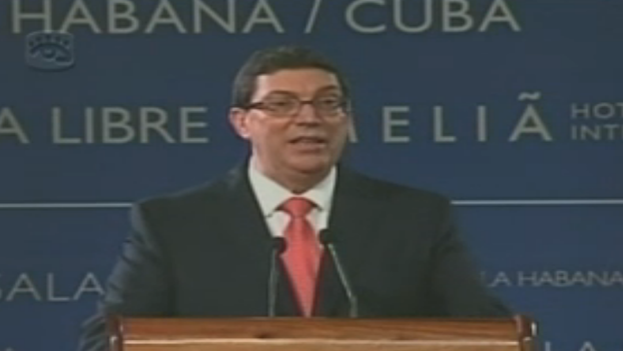
![]() 14ymedio, Reinaldo Escobar, Havana, 18 March 2016 – During his press conference on Thursday, Cuban Foreign Minister Bruno Rodriguez tried to diminish the importance of the United States’ most recent package of relaxations toward the island. His remarks were an attempt to curb any enthusiasm for the latest measures: permission for Cuba to use the dollar in its transactions, and the ability to pay Cuban citizens for their work in the United States or for US entities even if they are not migrants to that neighboring country.
14ymedio, Reinaldo Escobar, Havana, 18 March 2016 – During his press conference on Thursday, Cuban Foreign Minister Bruno Rodriguez tried to diminish the importance of the United States’ most recent package of relaxations toward the island. His remarks were an attempt to curb any enthusiasm for the latest measures: permission for Cuba to use the dollar in its transactions, and the ability to pay Cuban citizens for their work in the United States or for US entities even if they are not migrants to that neighboring country.
The most substantial part of his speech was the announcement of the elimination of the 10% tax on the dollar. In the newly inaugurated pressroom at the Havana Libre Hotel, the murmurs of joy could not be stifled when the minister declared, “As long as there is financial persecution, there will be taxation, only after verifying this security exists, will it be exempt.”
The foreign minister noted that, unlike the United States, Cuban has not placed restrictions on the citizens of that country visiting Cuba. However, he omitted the restrictions that Cuba’s immigration law imposes on Cubans living abroad, many of whom are denied authorization in their passport to travel to their country of origin. Others have even been prevented from boarding a plane to their homeland.
An interesting detail was that in his description of what Obama will do in Cuba, he passed over the clear intention of the US president to hold a meeting with dissidents and activists from independent civil society. It was also striking that none of the four journalists authorized to ask questions mentioned this issue, given that it has been so widely talked about.
To the question asked from Andrea Rodriguez of the Associated Press regarding whether “eliminating the tax” was the only thing Cuba was offering in response to the new package of measures from the US aimed at normalizing relations, the foreign minister referred to measures taken by the Revolution since 1959, specifically those that caused the rupture in relations. “Cuba is a country that is constantly changing,” he said, and offered as an example the Guidelines agreed to at the Sixth Congress of the Communist Party of Cuba.
On the street, the only thing people were talking about was the elimination of the tax and almost no one objected to the conditions mentioned for its implementation at the currency exchanges. Cubans take it for granted and think that the measure could bring as a collateral consequence an increase in the flow of remittances, because since the introduction of the tax in 2004 some of their relatives living in the United States felt they were being cheated with the artificial decrease in the value of the money they sent to family in Cuba.
Most of the people on the street consulted by 14ymedio were indifferent to the demand to return the Guantanamo Naval Base as well as to the reiteration at the negotiating table that there will be no talk of internal changes in Cuba because these “are and will be the sovereignty of our people.”
As much as the foreign minister wanted to sow discouragement, optimists continue to believe that Obama will bring in his diplomatic pouch irresistible offers for the people and that the government will have no option but to adapt the rigidity of the system to the new proposals, or to continue playing the role of the spoilsport.
